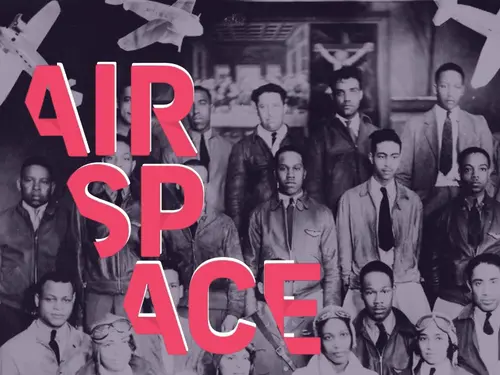
Janet Bragg: The First Black Woman with an Unlimited Commercial Pilot's License
Feb 16, 2018
By Updated by Dorothy Cochrane and Amelia Grabowski
“There were so many things they said women couldn’t do and Blacks couldn’t do,” Janet Bragg told the Chicago Tribune in 1992. “Every defeat to me was a challenge.”
Bragg wasn’t exaggerating. A Black woman in deeply segregated America, she faced barriers at nearly every turn. When she overcame them, Bragg made history … and paved the way for other aviators.
Defying Expectations as a Start: Janet Bragg's Remarkable Education
Bragg was born in Georgia in 1907, the youngest of seven children. “We were not a rich family, only rich in love,” Bragg later told the University of Arizona.
Her father believed, “If Jack can do it, Jill can do it,” leading Bragg to feel “I could do anything I set my sights on.” This was no small statement. Just two generations earlier, Bragg’s maternal grandfather had been enslaved. The legacy of slavery and systematic racism permeated Georgia in the early 1900s. Opportunities for Black people were limited, doubly so for women. (White women in Georgia couldn’t even vote until 1922.)
However, Bragg preserved. She switched schools, going from the separate and unequal segregated public school to private religious schools that offered a better education. She went on to study nursing at Spelman Seminary (now Spelman College). In a class of 12, she was one of two nursing students who survived the probationary period.
Bragg moved to Chicago after earning a nursing degree in 1929. Moving to Chicago would lay the groundwork for her impressive flying career.
Joining a Thriving Community of Black Pilots in Chicago
Chicago was a hub for Black aviators in the 1920s and 1930s. The city was home to multiple clubs for Black aviators, including the Challenger Air Pilots Association.
The founding members of the Challenger Air Pilots Association, Cornelius Coffey and John Robinson, had been the first Black pilots to train at the Curtiss-Wright Aeronautic School. After successfully earning their license, they were hired to train other Black pilots.
The assumption was certainly that Coffey and Robinson would train other Black men. However, Bragg saw the advertisement for the first class in 1933 and registered. She was the only woman in a class of 24 men.
How Bragg Helped Lead the Challenger Air Pilots Association to New Heights
Bragg quickly became a leader in the Challenger Air Pilots Association. Working as a registered nurse, she saved enough money to buy an airplane for $500 in 1934 (over $11,850 in 2025).
The Challenger Air Pilots Association established its own airport in nearby Robbins, Illinois, in 1933. Cornelius Coffey started his own aeronautics school. Bragg let both use her airplane. It was the club and the school’s first, and for a time only, airplane.
Eventually, Bragg was also a flight instructor. She taught other women, Black and white, to fly.
One of The First Black Woman to Earn a Commercial Pilot's License ... and the Racism That Stood in Her Way
In 1942, Bragg flew to Tuskegee, Alabama, home of the Tuskegee Airmen, for additional training. She was working towards earning her commercial pilot’s license.
The environment of the deep South was very different from Chicago. When Bragg's group had to make a forced landing in Boaz, Alabama, a white resident threatened them. “His southern hospitality wasn’t the kind we were looking for,” Bragg recalled. They flew on to Huntsville after refueling.
Bragg tested for her commercial pilot’s license while she was in Alabama. The chief instructor at Tuskegee, “Chief” Charles Anderson, asked the white test administrator how Bragg did. The administrator replied, “She did very well, I’ll put her up against any of your instructors. I’ve never given a color girl a commercial pilot’s license, and I don’t intend to.”
Bragg eventually received her commercial license at the Pal-Waukee Airport near Chicago in 1943. She was the first African American woman to earn a not limited commercial pilot’s license. (Willa Brown had earned a limited commercial pilot's license, which limited her to carry passengers within 50 miles and only in daylight.)
Bragg Faces Racism in the World War II War Effort
As World War II continued, Bragg applied to be a member of the Women Airforce Service Pilots (WASP). WASP flew military aircraft on the home front, freeing male pilots to fly in combat.
When she arrived for her interview, the assistant to the head of program remarked, “I don’t know what to do … I’ve never interviewed a color girl for flying.” Bragg responded, “We have plenty of them fly.”
Ultimately, she was rejected from the WASP program on the basis of race. In a 1989 oral history interview, Bragg recalled, “I was qualified. I think some of the girls who flew the WASP didn’t even have their private license. They had just soloed and were ferrying planes and different parts.” In fact, white women that Bragg taught were accepted.
Bragg continued to fly through the 1970s. She also continued to work professionally in health care for decades. In her autobiography, Soaring Above Setbacks, as told to Marjorie Kriz, Bragg remarked, “I think I've had a wonderful life.”
This blog was adapted from it’s original version, published with the title "Janet Bragg: How an Early Black Pilot Soared Above Setbacks" in 2018. In 2025, Dorothy Cochrane and Amelia Grabowski updated the blog. You can read the original version via Internet Archive.
Related Topics
Related Objects

We rely on the generous support of donors, sponsors, members, and other benefactors to share the history and impact of aviation and spaceflight, educate the public, and inspire future generations. With your help, we can continue to preserve and safeguard the world’s most comprehensive collection of artifacts representing the great achievements of flight and space exploration.
Support the Museum
We rely on the generous support of donors, sponsors, members, and other benefactors to share the history and impact of aviation and spaceflight, educate the public, and inspire future generations. With your help, we can continue to preserve and safeguard the world’s most comprehensive collection of artifacts representing the great achievements of flight and space exploration.






